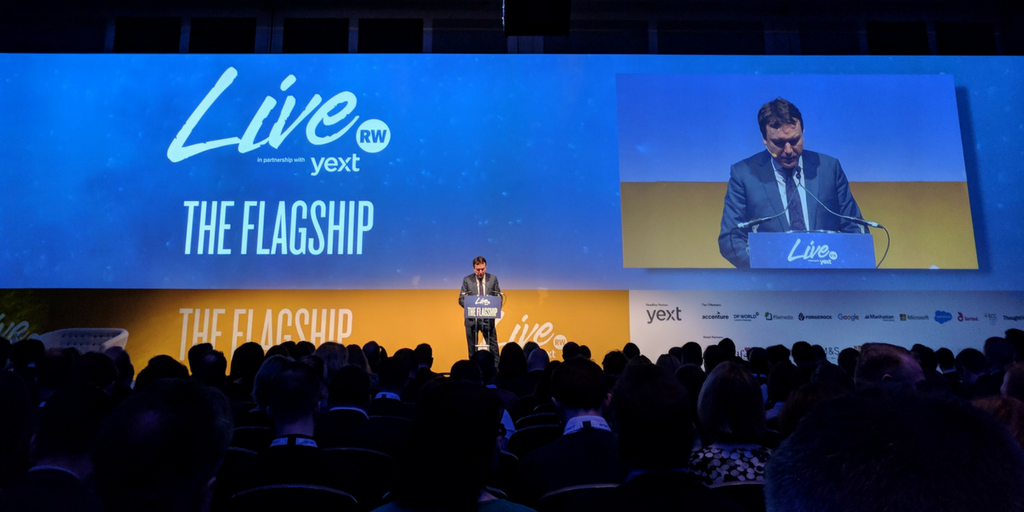
Five Key Takeaways from Retail Week Live 2018
On the 7th March, I headed down to the Intercontinental Hotel at the O2 to spend a day at Retail Week Live with one of our clients, Manhattan Associates. I absolutely love attending events and conferences like this, and whilst they usually consist of early starts and achy feet, they are always packed with industry insights and inspiring speakers. If you missed the event, you can find a minute by minute rundown of the key takeaways as they happened on the Retail Week Live live blog, but I’ve rounded up my favourite insights from the event.

Retailers should do more than just business
Jeremy Darroch, Group CEO at Sky kicked off the day’s talks. He talked a lot about how consumer technology has changed how people consume content and how technology has changed over the last ten years. As a content-driven company, Sky is acutely aware of this. For example, sports and news will always be live, but drama and documentaries are increasingly watched on demand. As we enter ‘tomorrow’s world’, organisations need to be aware of changes to customer demand and how they behave so innovation is absolutely key if they are to succeed.
Tech aside, Jeremy went on to explain how he felt about the environment. With Blue Planetbringing to the worldwide plastic problem to everyone’s attention, it’s something that Jeremy also feels very passionate about. He said that businesses should see themselves as a platform for good and strive to do something more than just generate revenue.
“We need healthy oceans for a healthy planet and if we don’t have a healthy planet we won’t have a good environment to bring our children up in,” said Jeremy. “Plastic is a fixable problem that requires action and Sky have 150 million people we can speak to.” Sky recently launched their Sky Ocean Rescue scheme which works with small businesses and charities to clean up our oceans.
There’s still a place for the store as retail moves online
John Rogers, CEO at Sainsbury’s Argos looked at where the store is headed as retail moves online. Argos have seen a 5% shift to the online channel year on year, which might be enough for any retailer to pack their bricks and mortar bags and move online. However, 80% of their orders are still fulfilled from a store – so how do they approach this?
When they acquired Sainsbury’s, Argos had lots of surplus space in their stores. So in order to help make this space profitable, they put Argos Click & Collect pick up points in the supermarkets. Not only did this make their services more convenient, but also increased grocery sales by up to 1.5%. This combination approach has helped secure the success of Sainsbury’s and Argpost-acquisition and proves that the store is still needed.

Always interrogate your technology
Craig Summers, UK Managing Director of Manhattan Associates spoke alongside Steven King, Head of Technology at Kurt Geiger about the technology that customers really want. In an industry where there are a lot of shiny new things, it’s very easy to want to adopt the latest greatest product to solve a problem. However, retailers need to be careful because if they are to fulfill the aim of ‘selling more and spending less,’ they need to look at the technology they want to implement and ask if it will actually add value to the business. Understanding trends early will help retailers gain a better understanding of whether certain technologies will work for their business and ensure they have a head start if they want to deploy them.
Stories create magical experiences
One of my favourite talks was by Shamil Thakrar, founder of Indian restaurants, Dishoom. Inspired by the Irani cafes in Bombay, Dishoom was founded to pay homage to those experiences of togetherness. Dishoom have seven restaurants across the UK and each one carries a different story.
Shamil said that every time he opened a new restaurant, he wrote a story, imagining himself as an Irani protagonist arriving in India for business. Their Kings Cross restaurant is in an old train shed, so he imagined himself stumbling across the shed and deciding to sell fine tea from it and filling it with beautiful objects before it became a successful restaurant. Their latest addition is in South Kensington and is art deco inspired, so each evening of the opening fortnight became ‘A night at the Bombay Roxy’, a speakeasy club with singers.
It’s no surprise that Dishoom have managed to create an experience that people queue out the door for.

Artificial Intelligence isn’t hype – it’s happening
The final panel came with a strong, simple message – “There’s no point in asking whether [retailers] should adopt new technologies like AI. They are going to arrive and retailers are going to have to move with the times.” said Paul Clarke, CTO at Ocado.
So it’s a fact – AI is going to transform the way that we work, play, shop and live. Although there might be some organisations hesitant to adopt, there’s no escaping the conversation. It’s not a question of if, it’s a question of when and how fast this change is going to happen, so it’s important retailers are aware of this and prepare to integrate it if they can.
Did you make it to Retail Week Live? What were your highlights? Tweet us: @NeoPRLtd




